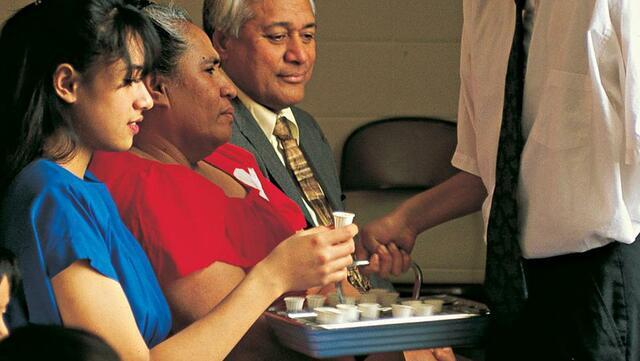Editor's note: This article is part of a series on what the Church has actually taught about various topics. To read more about the Church’s teachings on cremation, garments, beards, and more, click here.
As members of The Church of Jesus Christ of Latter-day Saints, we’ve all heard different ideas about how to spend our Sundays. The doctrine of keeping the Sabbath day holy has never changed, but the nuances of exactly how we keep it holy have blurred the line between myth and doctrine. So, what has the Church actually said about keeping the Sabbath day holy?
Our prophet, President Russell M. Nelson, makes it clear what our attitude toward the Sabbath should be.
“In my much younger years, I studied the work of others who had compiled lists of things to do and things not to do on the Sabbath. It wasn’t until later that I learned from the scriptures that my conduct and my attitude on the Sabbath constituted a sign between me and my Heavenly Father,” he said.
“With that understanding, I no longer needed lists of dos and don’ts,” President Nelson said. “When I had to make a decision whether or not an activity was appropriate for the Sabbath, I simply asked myself, ‘What sign do I want to give to God?’ That question made my choices about the Sabbath day crystal clear.”
With President Nelson’s counsel in mind, perhaps the reason so much of our Sabbath worship comes down to interpretation is that Sunday worship is less about a checklist and more about developing our relationship with God. Still, counsel from other Church leaders and verses of scripture can guide us as we determine how to give a clear sign to God that we desire to serve Him.
One of the Ten Commandments God gave Moses was to “remember the sabbath day, to keep it holy” (Exodus 20:8). The word “Sabbath” comes from a Hebrew word meaning “to rest from labor,” while the word “holy” means to dedicate something to God or to make it sacred. Sunday is supposed to feel different from any other day, and the way we make it different is through our actions.
Elder Mark E. Peterson (1900–1984) of the Quorum of the Twelve taught, “We can readily see that observance of the Sabbath is an indication of the depth of our conversion.” He explained that whether we choose to intentionally worship Jesus Christ on Sundays measures our attitude towards the Savior: “It is a sign of whether we are Christians in very deed, or whether our conversion is so shallow that commemoration of his atoning sacrifice means very little or nothing to us.”
The For the Strength of Youth pamphlet teaches, “The Lord has given the Sabbath day for your benefit and has commanded you to keep it holy. Honoring the Sabbath day includes attending all your Church meetings.”
The pamphlet also says to be reverent during Church meetings, including being on time, being willing to learn, and avoiding distractions. It also says, “Your behavior and dress on the Sabbath should show respect for the Lord and His holy day. Sunday is not a day for shopping, recreation, or athletic events. Do not seek entertainment or make purchases on this day.”
Our leaders’ continued emphasis on Sabbath observance over the years shows that while the doctrine does not change, we still need reminders of its importance.
President Spencer W. Kimball (1895–1985), the 12th President of the Church, suggested we use the Sabbath day to take inventory of our sins and weaknesses, read good books, rest and relax, visit the sick, spend time with family, and generally use Sunday as “a day to do good.” He also said we should make time for writing in journals, praying and meditating, writing to missionaries, holding family councils, singing hymns, and doing family history work (Teachings of Spencer W. Kimball, 216–17).
As far as what to avoid, President Ezra Taft Benson (1899–1994), the 13th President of the Church, said we should be careful to “consider what activities do not fit the spirit or purpose of the Sabbath.” Some examples he gave include overworking and staying up too late on Saturdays and having so many meetings on Sundays that we have no time for “prayer, meditation, family fellowship, and counseling.”
President Benson also discouraged taking trips, playing sports, hunting, reading nonspiritual materials, shopping, making social visits, “wasting time, and engaging in other amusements.”
President Gordon B. Hinckley (1910–2008), the 15th President of the Church, emphasized that members of the Church should not shop on the Sabbath.
“There isn’t anybody in this Church who has to buy furniture on Sunday. There really isn’t,” he said. “There isn’t anybody in this Church who, with a little care and planning, has to buy groceries on Sunday. … You don’t need to make Sunday a day of merchandising” (Heber City/Springville, Utah, regional conference priesthood leadership meeting, 13 May 1995).
How do we approach work on the Sabbath? Exodus 20:10 says to do no work on the Sabbath or make anyone else work, either. But in Luke 6:9 when the Pharisees criticize Jesus Christ for healing on the Sabbath day, Christ asks them, “Is it lawful on the sabbath days to do good, or to do evil? To save life, or to destroy it?”
Later, in Luke 14:5, the Lord also teaches, “Which of you shall have an ass or an ox fallen into a pit, and will not straightway pull him out on the sabbath day?” He shows by example that service is a part of keeping the Sabbath day holy, not something to be avoided.
Some jobs require working on the Sabbath. President Kimball made the following distinction between the motivations that fuel our work: “Some of the work that is truly necessary—caring for the sick, for example—may actually serve to hallow the Sabbath. However, in such activities our motives are an important consideration. When men and women are willing to work on the Sabbath to increase their wealth, they are breaking the commandments; for money taken in on the Sabbath, if the work is unnecessary, is unclean money.”
While there are some activities that are clearly outlined as being allowed or discouraged, Sabbath day observance is ultimately a personal matter. Mark 2:27 teaches, “The sabbath was made for man, and not man for the sabbath.”
President George Albert Smith (1870–1951), the 8th President of the Church, said that the Lord “has set apart one day in seven, not to make it a burden, but to bring joy into our lives and cause that our homes may be the gathering place of the family” (“Obey the Commandments,” Improvement Era, Jan. 1949).
Duties and Blessings of the Priesthood: Basic Manual for Priesthood Holders says that some “uninspired” past religious leaders implemented trivial restrictions. “Rather than being a blessing and a joy, the Sabbath became a burden,” the manual says.
When we focus too much on the do’s and don’ts, we lose sight of what keeping the Sabbath day holy is truly about: developing our faith and becoming more like Christ.
During a 2015 Church News roundtable discussion, Elder Anthony D. Perkins, executive director of the Communication Services Committee, said our faith increases when we practice using our agency and seek the guidance of the Holy Ghost to choose how to observe the Sabbath.
President M. Russell Ballard of the Quorum of the Twelve shared his joyful testimony of the Sabbath, calling it a gift.
“The power of the Sabbath day is to experience in church and at home the delight, the joy, and the warmth of feeling the Spirit of the Lord without any kind of distraction,” he said. “Remember the gift of the Sabbath day.”





















